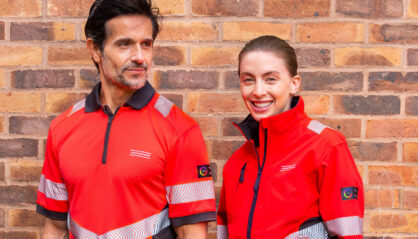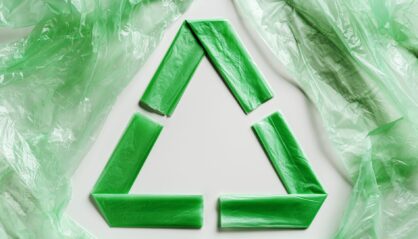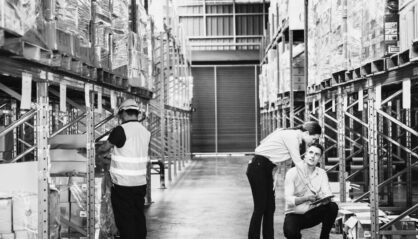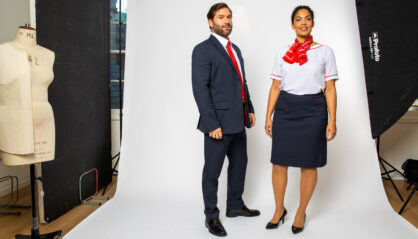The Journey Of Designing Sustainable Workwear

Now, more than ever, sustainability is a common topic of discussion. No matter the business, many companies are turning towards more eco-friendly practices and keeping the planet in mind. In the world of business ‘sustainability can be perceived in different ways. But currently environment, social and governance (ESG) is a primary context in which business sustainability is often referred’.
Businesses can begin assessing their carbon footprint by looking at their workwear practices. Choosing more ‘sustainable work uniforms is a small step that can have a profound impact on the environment’, as the creation, design and disposal of a company’s uniforms can prove extremely harmful to the planet. Textiles are one of the leading waste items found in landfills and in an effort to reduce this, many businesses are choosing to move away from a ‘one-size fits all’ approach to their workwear. As experts in the field of sustainability, we offer uniforms which are not only custom made to our client’s requirements but are also designed with the planet in mind.
How We Select Our Materials & Fabrics
‘Sustainability must become business as usual for all of us woven into every aspect of how we live’ and this is how we like to view our choices of material, when we design custom uniforms. We want to choose fabrics which are not only perfectly suited to the client and their needs, but also beneficial to the planet.
Firstly, as part of our Green Thread Initiative, we like to audit the textiles that are currently being used on the staff’s uniforms. We do this so we can take a closer look at the zips buttons and other trims. All of these can be replaced with recycled or natural equivalents, typically made from wood pulp or coconut shell.
We also design all our garment bags and cartons. Commonly garment bags are made from vinyl, polyester or nylon. This is often to make them lightweight and easier to transport. We prefer to make our bags from cornstarch or recycled and LDPE recyclable materials. This way, we can flat-pack our garments more efficiently and avoid using plastic hangers.
Our Manufacturing Process With The Environment In Mind
Our eco-conscious journey starts within our factories. We ensure that we regularly audit our in-person factories in our supply chain network. We always check that all our environmental standards are being met consistently and our ethical practices are being upheld. As for clients, they are also welcome to attend these factory visits with us and experience our pushes to be more environmentally conscious. We also utilise Street SmartTM, which is our end-to-end supply chain and fulfilment system. This makes the journey of every single one of our garments traceable and transparent for our clients.
Also during our manufacturing process, we use innovative practices and technologies whether possible. For example, designing custom uniforms with 3D design and development tools allows us to cut down on our lead time as well as many samples are required. In these early stages of creating sustainable workwear, we are looking to the client for edits and desired changes. This can mean that we may need to create new and reworked garments. By using advanced technology, we can reduce the environmental cost of materials and shipping during this stage.
In striving to reduce our carbon footprint, we prioritise selecting from our network of exceptional UK suppliers. This approach minimises the need for excessive transportation and contributes to the sustainability goals we hold at the heart of our business. Whilst we do try to make everything on our doorstep, sometimes items can not be manufactured locally. In this instance, we will ship our garments by sea instead of using air travel. This reduces our carbon emissions massively, and with our continual use of Street SmartTM we can still consolidate orders and minimise storage without compromising availability.
Our Recycling Initiatives
With so much fabric ending up in landfills, our recycling initiatives have become ongoingly important. With this in mind, we design every custom workwear piece in-house or rework with existing designs, constantly keeping our end-of-life disposal in mind. We understand that it’s not just the textiles being used in clothing that means they end up in landfills, it’s also the construction and trim. That is why we believe that being able to recycle uniforms starts at design.
As mentioned before, we stick to our Green Thread Initiative here, which we believe reduces the ecological cost of a custom uniform. Not only in the manufacturing process, but also in distributing it and wearing of it. Additionally, we also offer a wide range of responsible end-of-life strategies including the collection and recycling of new fabrics, to the de-branding for re-use and upcycling of old uniforms.
Our Collaboration With Common Objective
We are also a proud member of the Common Objective (CO), a ‘leading global sustainable sourcing platform’. As experts in the field of sustainable custom workwear, our foremost priority is to minimise our environmental footprint while ensuring the health and safety of both our employees and the public.
The Common Objective’s values surrounding sustainability lines up perfectly with how we here at JSD also like to operate. The Common Objective believes in the ‘triple bottom line’, ‘in which people, planet and profits are considered equally fundamental to business success’. We too, believe that conducting business should always be accompanied by the respect for both people and the planet that surrounds us.
How We Can Improve Your Companies Carbon Footprint – Jermyn Street Design
At the heart of every business is a uniform that represents its identity, ethos, and professionalism. By overlooking the manufacturing and material selection process, it conveys that a company lacks concern about their impact on the environment. ‘With so much information out there, we have become increasingly aware of how our choices can impact the environment’ and how we approach workwear should be no different. With the development of sustainable workwear and bespoke uniforms now more accessible, sustainable practices and fabrics have also become more popular. If you are looking to improve your company’s image and customer perception, get in contact with our team today to design a uniform that not only aligns with your brand’s aesthetic but also contributes positively to the planet.





